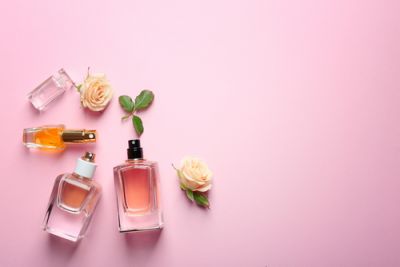 You may have already thought about how individual elements such as clothing, footwear, and accessories will factor into your wedding day style. Meanwhile, scent is a powerful sensory detail that impacts emotions and wellbeing, so it makes sense to incorporate a fragrance into your look. An introduction to how perfumes work plus some sage wisdom should put you on the right path to choosing a fragrance for your wedding day.
You may have already thought about how individual elements such as clothing, footwear, and accessories will factor into your wedding day style. Meanwhile, scent is a powerful sensory detail that impacts emotions and wellbeing, so it makes sense to incorporate a fragrance into your look. An introduction to how perfumes work plus some sage wisdom should put you on the right path to choosing a fragrance for your wedding day.
Perfumery 101: Basic Concepts
Since humans first learned how to make fragrances from natural ingredients, the general process has involved distilling new blends from distinctive recipes of “notes,” or scented compounds traditionally derived from organic sources such as flowers, fruit, trees, herbs, spices, or resins. While animal scent glands were once used for their musk, these substances are now produced in laboratories to avoid causing endangered species to go extinct. Meanwhile, other synthetically created versions can mimic smells like sea water, linen, or even vinyl records.
Dapper Confidential explains that these essences are grouped together to create compositions that achieve different aromatic effects over time. Top notes usually incorporate lighter ingredients and give the fragrance’s “first impressions” and generally wear off after around 30 minutes. The middle notes, or “heart,” contain core aromas that last for several hours. The base notes, usually comprised of woody, incense, mossy, or musk accords, act as support or structure for the rest of the blend and linger the longest.
How Fragrance Families Work
The Perfume Society clarifies that fragrance family categorizations tend to be subjective, and even industry experts disagree on how to group some scents. However, they’re meant to serve as general guidelines to help fragrance brands describe their products. Most classification schemes include several basic fragrance families:
- Fresh scents, described as clean, zesty, and bright and containing green, citrus, and marine accords
- Floral and woody fragrances, named for their primary types of notes
- Oriental blends, stylistically evocative of perfumes from antiquity and packed with spices, musk, incense, vanilla, and woods
- Chypre (pronounced “sheep-ra”) scents, which feature woods and mosses with some floral, citrus, or incense accords
- Fougère fragrances, blending light florals and mosses to exude a green, fern-like quality
Selecting a Fragrance for Your Wedding
Both Brides contributor Katharine Santana and the writers at Dapper Confidential suggest that you consider several factors when picking your wedding day scent:
- Your venue
- The season
- Your event’s formality level
- Time of day
Keep in mind that a strong scent can overwhelm others if you’re in close quarters, but you’ll need an intense version for an outdoor ceremony or in a location with lots of open space. The overall ambiance of your location can also guide your selections, such as a floral fragrance matching naturally with a garden wedding. Lighter scents tend to be ideal for morning or afternoon events and warmer weather, while heavier fragrances bring some added boldness for evening weddings and won’t overpower during fall or winter.
Both also recommend choosing fragrances based on their longevity, since those with a higher percentage of perfume oils last longer than lighter editions. Note that a “parfum” or “eau de parfum” contains between 15 and 40 percent perfume oils while an “eau de toilette” only packs in between five and 15 percent. An “eau de cologne” has the lowest concentration, containing no more than four percent perfume oil.
Follow Your Nose and Your Heart
Your wedding day look combines many unique elements to forge a cohesive style. Your fragrance is also a small yet significant piece of the larger picture, but it might be a little hard to choose one for the big day. When you arm yourself with useful information and advice, you’ll have a much easier time picking your signature scent — and you might have a little fun during the process.
Add Your Comment